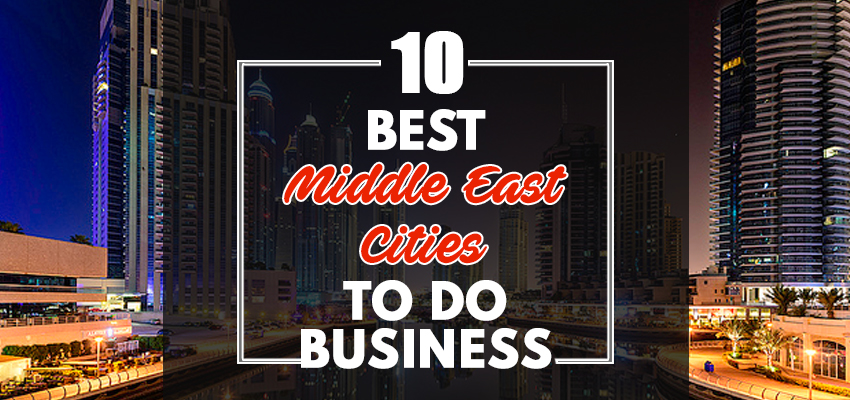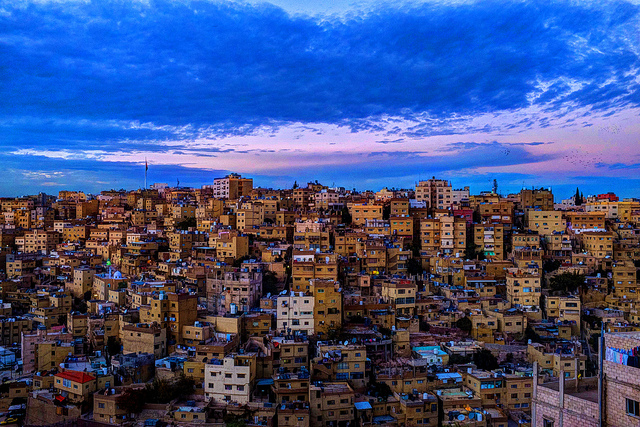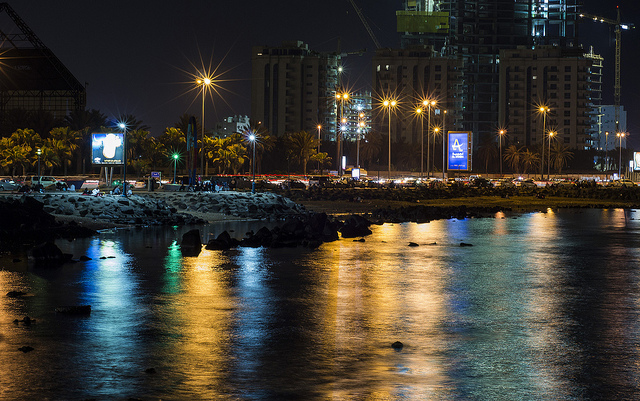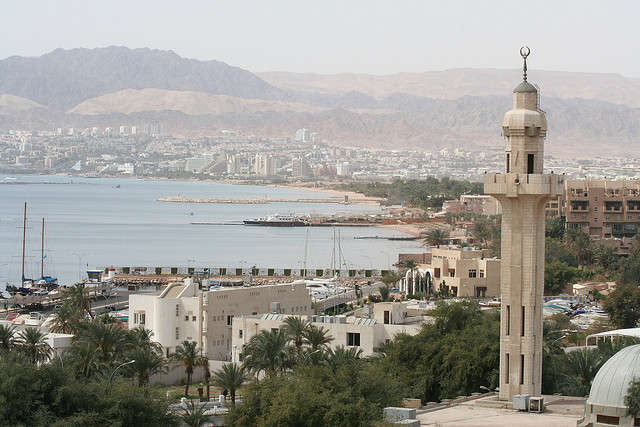Dubai, United Arab Emirates
Situated on the Persian Gulf, next to the Gulf of Oman, the city of Dubai is a renowned global city whose importance to the global economy is almost unparalleled. Because of its strategic position, actively diversifying economy, and excellent trade relations and prestige, Dubai is an excellent location for any businesses looking to expand or invest, especially in Middle Eastern, North African, and Central and South Asian markets, or anyone looking to do business in the Middle East region.
Dubai has established itself as an emirate and city on its oil industry, and that industry has fueled its current success as a cosmopolitan metropolis. The total GDP in the United Arab Emirates reached USD$536 billion in 2024, and is forecasted to expand by 5% over the course of this year and into 2025. While these figures represent the UAE as a whole, this economic health is also representative of the Emirate of Dubai, which is home to 41% of the total UAE population and ranks as the second wealthiest Emirate after Abu Dhabi.
While oil production used to constitute a whopping 50% of Dubai’s revenue, it currently only represents less than 1%. This is thanks to other industries that are booming in the Emirate, specifically wholesale and retail trade, as well as real estate and manufacturing. The tourism industry is also enjoying success in Dubai: 2023 was the best year ever for tourism in Dubai, with a record 1.22 million visitors, an 8 percent increase from 2022. Given that Dubai was named the 2024 top global destination in TripAdvisor’s Travelers’ Choice Awards, we can safely assume that Dubai’s travel, tourism, and hospitality industries will continue to thrive.
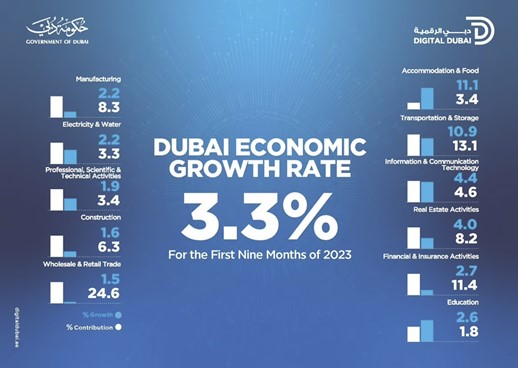
DigitalDubai’s breakdown of economic growth by industry
The alluring state of Dubai’s economy attracts many international business ventures. If you want to start a business in Dubai, there are a few things to be aware of before proceeding. Ownership laws in the UAE were recently updated favorably for foreigners, now allowing them to have majority ownership of businesses in Dubai and without an Emirati partner. According to Dubai Economic Authorities, 100% foreign ownership is available for more than 1,000 commercial and industrial activities, though some economic activities with a strategic impact are restricted for foreigners and reserved for Emirati businesses. Despite this, the process to start a business can be daunting for someone who does not know how to navigate the tricky business registration process, so it would be best to have someone who has gone through the process before as a guide. Dubai is tax-free, but does not hold a free trade agreement with the US, so tariffs can still be raised when engaging in trade between the two nations. However, there is an Investment Framework Agreement (TIFA) between the two nations, which offers local businesses a 10% preferential price in government procurement. UAE is also a member of the World Trade Organization (WTO).
If you’re curious about how to start a business in Dubai and all of the other cities mentioned in this article, please follow the link at the bottom of the page for more information.
Doha, Qatar
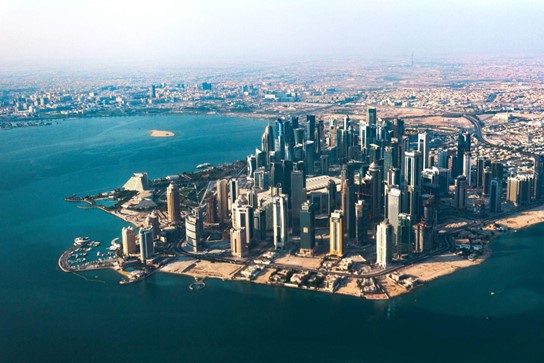
Image credit: Radoslaw Prekurat
Doha, the capital of the peninsula and state of Qatar, is another sound option when selecting a place to do business in the Middle East and North Africa (MENA). Qatar ranks 5th in the world for GDP per capita with USD$84,900 and a national GDP of USD$246.36 billion. While it is difficult to find statistics on Doha’s population given that it is a sprawling metropolis within a very small country (Qatar itself is only 160 km from north to south and 80 km from east to west), current estimates show that Qatar’s population was 3,210,000 in 2023 with 80% of those people living in Doha.
The economic wealth of Doha and Qatar, as a whole, is due entirely to the discovery of oil in the peninsula in 1940. Before this event, the primary revenue source for Qatar was pearl hunting, an industry that all but collapsed soon after Japan entered the scene with cultured pearls. Petroleum and natural gas production accounts for the majority of the country and city’s revenue, but the government is seeking to move away from oil dependence and expand its income source. All of Qatar’s top trade partners are Asian nations (Japan, South Korea, and India), making Doha a prime location for businesses targeting Asian markets. In recent years, Doha has seen a large expansion in the real estate and construction industries, particularly in preparation for the 2022 FIFA World Cup that was hosted in Qatar. After being rescheduled due to the Covid-19 pandemic, the World Cup in Qatar that took place in November and December 2022 brought with it a massive economic boom: the national GDP rose at a rate of 2.7% from 2022 to 2023, nearly double the rate in previous years. Additionally, Qatar welcomed over a million international visitors to watch the World Cup, causing a welcome uptick in revenue specifically in the hospitality sector.
In order to start a business in Qatar, you must first go through a lengthy registration process at the Ministry of Trade and Business. Knowing Arabic or having a business partner who knows Arabic is imperative, as part of the registration process is submitting articles of association which must be prepared and written in Arabic before being accepted. Ownership laws are more restrictive in Qatar than in the UAE, as foreigners are not allowed to have majority ownership of enterprises in Qatar, so you must also find a business partner who is a national to own at least 51% of your company. The partner is not legally obliged to contribute financially to the enterprise or to assist in the daily operation of the company and, as majority owner, can terminate operations at any time. The partner must either be an individual Qatari or a local company that is 100% owned by Qataris. Qatar is also a member of the World Trade Organization.
Abu Dhabi, United Arab Emirates
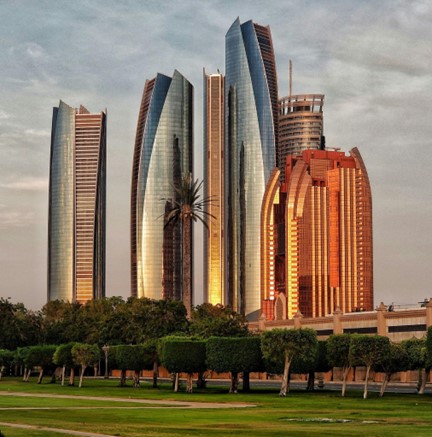
Image credit: Kamil Rogalinski
Located a mere 147 kilometers (91.3 miles) from the first city on our list, the city and emirate of Abu Dhabi is another great choice for potential locations to do business in the Middle East. As the capital of the UAE, Abu Dhabi is the seat of the Emirati government and is home to the President of UAE, Mohammed bin Zayed Al Nahyan. The emirate independently has one of the highest GDPs per capita in the world at USD$65,700 and is currently the richest emirate in the country, contributing 60% of the total GDP of the United Arab Emirates despite being home to only around 34% of the total Emirati population. Abu Dhabi is also a city of great economic importance. Currently, there is over one trillion dollars globally invested in the city, making it a hotspot for investors seeking new markets and entrepreneurs from all over the globe.
Like the rest of the UAE, Abu Dhabi built its wealth from its oil resources, which currently account for just under 50% of its GDP. Abu Dhabi is currently undergoing an extensive shift from an oil/gas-based economy and is diversifying itself through an increased focus on tourism and real estate projects. As a result of the new real estate properties, Abu Dhabi frequently appears on “Most Expensive Cities in the World” lists. Abu Dhabi’s importance as an international financial hub is clearly recognized and offered the spotlight through events like the prestigious 2024 Forbes 30/50 Spotlight, which will be hosted in Abu Dhabi in March of this year. This event honors 30 of the world’s leading entrepreneurs under the age of 30, and added in a new category of 50 over 50, specifically for women with dedicated experience and leadership in their fields. As the Forbes’ page states, Abu Dhabi was chosen for this famous event due to its role as “one of the world’s great crossroads.”
In terms of international business, Abu Dhabi is a tax-free and duty-free city. This makes it optimal for extensive trade, especially because the Emirate of Abu Dhabi repatriates all of the profits from a foreign venture to the owners without holding any of the revenue. This makes Abu Dhabi an extremely competitive option when picking a new place to do business. The process for starting a business and restrictions on businesses are the same throughout all of UAE, so as of 2022, as a non-national, you can have full ownership of a company as opposed to prior restrictions that prevented this.
Cairo, Egypt
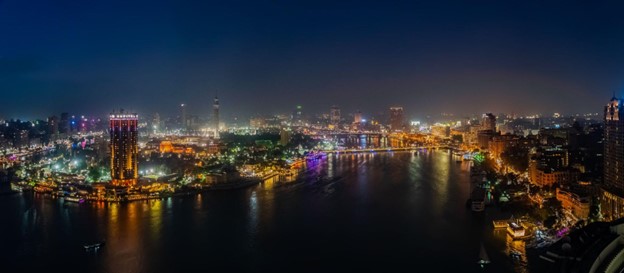
Image credit: Sean Wang
Home to one of the oldest civilizations in human history, the country of Egypt has undergone drastic change, with revolutions and social movements toppling regimes and causing massive upheaval and discontent all throughout the nation. The election of Abdel Fattah el-Sisi in 2014 ascended him to the presidency and slightly flared tensions in the capital. Cairo is currently the largest city in Egypt, Africa, and the whole Arab world and its cultural significance is immeasurable to both past and contemporary civilization. It is also the current economic center of Egypt. Because of its economic significance and cultural renown, Cairo is one of the best places to do business in the Middle East.
While not as strong as the Gulf countries, Egypt’s GDP has been rising steadily over the past five years at a rate of about 3.3% annually.The largest portion of Cairo’s revenue comes from the service industry, particularly tourism. In addition to that, Cairo also has a sizeable construction industry, with the government recently announcing plans for the development of 20 new cities around Cairo, which will accommodate not only Egyptians but also expats working in the capital area. With support from the International Monetary Fund, infrastructure has been greatly improved and Egypt is taking strides in the field of renewable energy as home to the world’s fourth largest solar power plant. Cairo also has a heavy industry sector, meaning hydrocarbons, textiles, etc. The latter industry benefits from Cairo’s Qualifying Industrial Zone (QIZ), which is a tax-free industrial park. The zone, made in collaboration with Israel, allows businesses in Cairo to benefit from the US and Israel’s free trade agreement. Because of the way the zones were devised, a portion of all zone-produced goods must have Israeli input, but almost all items produced in the QIZ can reach US markets without having tariffs imposed upon them and without quotas attached to them.
There are, however, a few downsides to expanding your enterprise in Cairo. While non-nationals can own an LLC, if they want to import goods for trading in Egypt, the LLC must be at least 51% owned by Egyptians and have one Egyptian manager responsible for importation. In addition to that, foreigners are restricted from employment in certain sectors, such as customs and tourism, and there are restrictions on the percentage of non-Egyptians that can be employed by companies based in Cairo. This is particularly true in computer services, where 60% of upper-tier management must be Egyptian three years after start-up. Despite these things, Cairo is still an excellent place to start your business. Egypt is also a member of the World Trade Organization.
Amman, Jordan
In the heart of the northern Middle East, between Iraq, Israel, Palestine, Saudi Arabia, and Syria, sits the country of Jordan. The capital, Amman, has been occupied by the Assyrians, Romans, Turks, Umayyads and many more great civilizations and has been given many names throughout its long history, stretching at least back to the 13th century BC. Currently, Amman is a major tourist hub, particularly to citizens of the Persian Gulf countries, and is one of the most visited cities in the World. There are several multinational companies expanding into Amman and operating there with regional bases. It is an excellent location for anyone looking to do business in the Middle East, particularly in the Levant area (Israel, Jordan, Lebanon, Palestine, Syria).
Despite a heavy surge of refugees from the ongoing conflicts in Syria and Iraq, the country of Jordan has remained relatively peaceful, meaning a stable, safe environment to do business. The largest source of income for Jordan and Amman is the service industry. The focus service is tourism, due to Jordan’s abundance of popular tourist destinations, including the city of Petra, which was named one of the Seven Wonders of the Modern World in 2007. Of particular interest is the kingdom’s abundance of medical tourism, contributing to 14% of the total GDP and bringing in 164,000 medical tourists in 2023. This is likely because Jordan has one of the best healthcare and educational system in the Middle East, with an abundance of qualified medical professionals and well-equipped hospitals and clinics. Another large contributor to Amman’s economy is heavy industry, which receives benefits due to the presence of a Qualifying Investment Zone. Just like in Egypt, zone-produced goods are not subject to tariffs and imposed quotas as a result of the US and Israel’s trade agreement and in addition to that, Jordan has an actual trade agreement with the US and several other nations which it could benefit from.
Unfortunately, Jordan does not have the oil resources present in the Gulf, so its economy hasn’t experienced a giant boom yet, but many startup companies are flocking to Amman, particularly for technology and internet-based companies, as the majority of web content in the Arab World comes from Jordan. The Jordanian government is actively encouraging startups and has made efforts to facilitate entrepreneurial connections. If this trend continues, the world could see the development of a new Silicon Valley, following the path of Bangalore, referred to as the Silicon Plateau, to become “Silicon Hills”.
Riyadh, Saudi Arabia
The capital of one of the world’s richest nations, Riyadh is an economic titan and the most prosperous city in Saudi Arabia. With a national GDP of USD$1,069 Billion and an average GDP of USD$30,447 per capita, it is an excellent choice for selecting where to do business in the Middle East.
The economy of Saudi Arabia is mostly based on the oil industry, which is no surprise considering that the country holds the largest oil reserves in the whole world, and Riyadh benefits immensely from this oil industry, accounting for nearly 40% of Saudi Arabia’s overall GDP. As a direct result of its oil resources and industry, KSA is one of the leading members of OPEC. In addition to this, Riyadh and all of Saudi Arabia are going through a construction boom, meaning the heavy industries in the nation are on the rise. In terms of trade, the Kingdom imports a great deal of produce and other goods, such as textiles and machinery, due to a lack of arable land and the weakness of non-oil industries.
Riyadh’s place on the world stage appears to be on the rise, especially given its successful bid for the 2030 World Expo. The Saudi Arabian government has made a large investment in the Expo, with a budget of $7.8 billion for the event that showcases progress and innovation. This event is sure to boost the local economy through the tourism and hospitality sectors. Riyadh benefits from trade agreements with several nations, including the US. In fact, Saudi Arabia is the United States’ biggest trade partner in the Middle East. One potential drawback of doing business in Riyadh, depending on the business, is a lack of seaports or ocean access, due to the city being landlocked. It does however have relatively quick access to the city of Jeddah, which sits on the Red Sea to the West, and Dammam, which sits on the Persian Gulf.
Muscat, Oman
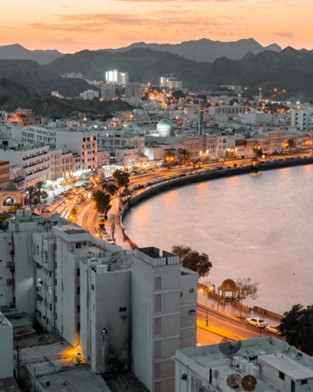
Image credit: Anfal Shamsudeen
The nation of Oman sits on the tip of the Arabian Peninsula, and its lovely capital of Muscat offers businesses a plethora of advantages to businesses looking to expand, but also comes with its own drawbacks. The economy of Oman is, just like almost all of its neighbors in the Persian Gulf, based on petroleum and natural gas production and refinement. While Oman may often sit in the shadow of neighboring countries like Saudi Arabia and the UAE for international economic activity, it should not be overlooked. With a GDP of USD$147.9 billion and a per capita GDP of $32,347, this southern Gulf nation boasts a healthy economy that is welcoming to foreign investors. Although Oman relies on oil for 80% of its national revenue, it is putting resources into developing the tourism, mining, manufacturing, and gas-based industries to supplement. The main commercial activity of Muscat, historically and contemporarily, is trade and the recent importance of oil has made trade extremely profitable in the area.
Unlike the other cities on this list, Muscat has direct access to the Arabian Sea, meaning it does not have to deal with the Strait of Hormuz in the Persian Gulf, which is currently a choke point of international trade. Muscat’s main port, Mina Sultan Qaboos, is a major trading hub, linking the Persian Gulf with the markets of the Indian subcontinent and far east and southeast Asia. Unfortunately, the increased prominence of Dubai for the global economy has taken business away from Muscat and into the UAE.
Like neighboring nations Qatar and the UAE, Oman is making steps to facilitate and encourage foreign investment. In 2024, foreigners are allowed to have 100% ownership of Oman-based LLCs without needing a local Omani sponsor. American investors and entrepreneurs tend to receive slight preferential treatment when conducting business in the country as the result of a trade agreement between the two countries.
Jeddah, KSA
The coastal city of Jeddah in Saudi Arabia is the Kingdom’s gateway to the Red Sea, and perhaps yours as well. Jeddah’s strategic and economic importance to KSA is evident by increased investment in the city on behalf of the Saudi government to develop a newer port and transform the city into a more powerful regional trading hub that can compete with the increasingly more prominent Persian Gulf trade. It is also evident by the current construction of Kingdom Tower, which will be the world’s largest building once it reaches completion, and Kingdom City, which is a construction project designed for the economic and social development of the country. It is planned to be built in north Jeddah. The city has also hosted Big 5 Saudi, an annual forum for Saudi and international construction companies to gather, trade, and exchange ideas. There are many other similarly-devised events, such as Concrete Zone and the LEED Workshop, which is focused on pursuing “greener”, more ecologically-friendly ventures.
Because of Jeddah’s close proximity to Mecca and Medinah, respectively the first and second most holy cities in all of Islam, many pilgrims participating in the Hajj, the obligatory visit to Mecca and the Kaaba all able-bodied Muslims must perform at least once in their life, must first pass through Jeddah on their way.
Jeddah boasts the same advantages as Riyadh, but benefits from being on the lucrative Red Sea and not being landlocked.
Manama, Bahrain
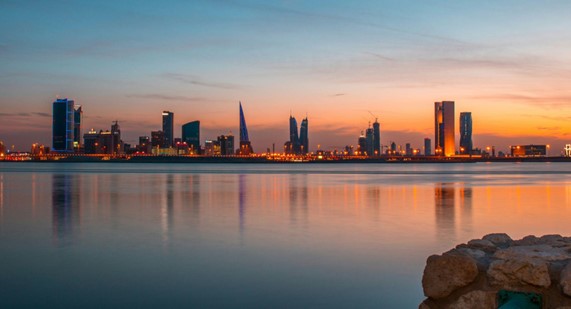
Image credit: Charles-Adrien Fournier
Coasting in the Persian Gulf, the tiny, island nation of Bahrain stands out as another beneficiary in the Gulf Coast oil boom. In fact, Bahrain was the first place in which oil was found on the Arabian side of the Persian Gulf. The nation is only connected via the King Fahd highway to Saudi Arabia by land and by no other countries. Manama, Bahrain’s capital, is another excellent option for where to do business in the Middle East. . It offers ownership rights in line with the regional norm, allowing for foreigners to unexceptionally fully own their companies. Non-nationals are still not allowed to own land or property except in certain designated zones. Fortunately Manama, and Greater Manama, is one of these zones so you could purchase real estate there.
These make Manama one of the easiest places to do business, without having to go through the hurdle of having a business partner who is a national. Bahrain currently has a trade agreement with the US along with other nations all throughout the world, particularly those in Asia.
Kuwait City, Kuwait
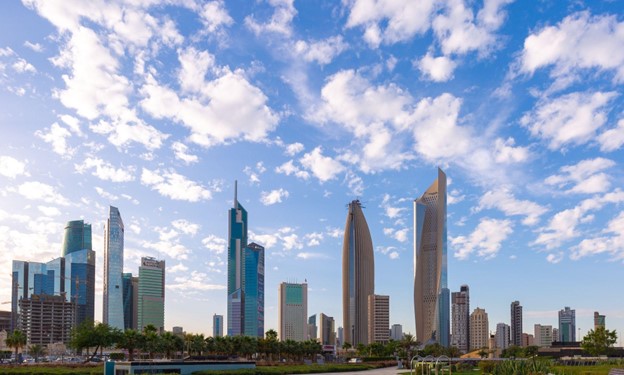
Image Credit: Ahmad Mohammed
Nestled in between Iraq and Saudi Arabia along the Persian Gulf lies Kuwait, a country of 4.25 million people mostly concentrated in the capital, Kuwait City. Kuwait is a member of the Gulf Cooperation Council (GCC), and like many of its neighbors, enjoys a high GDP of USD$167 billion in 2024, as well as significantly low unemployment and inflation rates. In fact, the Kuwaiti Dinar (KWD) is the highest-valued currency in the world!
While the majority of Kuwait’s revenue comes from its oil reserves (about 90% of government export revenue), the country has a long legacy of undertaking efforts to diversify and strengthen its economy: many are surprised to learn that the world’s first sovereign wealth fund was founded in Kuwait in 1953. Kuwait is in the midst of implementing its Kuwait Vision 2035 initiative, aimed at reducing reliance on oil reserves and channeling funds into boosting other industries such as tourism and tech. Currently, the pharmaceutical and technology industries are among the top revenue earners in Kuwait, aside from oil refining.
There are advantages and challenges to conducting business in Kuwait City. First of all, Kuwait has no personal income tax or corporate tax, which is a clear benefit for businesses and investors. The banking system is reliable and friendly to foreigners, who, in some cases, are allowed to have 100% company ownership. Generally, foreigners are only allowed to hold up to 49% ownership in Kuwaiti companies. Another potential challenge to doing business in Kuwait is that a business visa is required, which involves receiving sponsorship from a Kuwaiti company beforehand. If Kuwait’s strong economy and business potential sound interesting to you, reach out to IstiZada to learn more about how we can work with you.
Aqaba, Jordan (Honorary Mention)
Being the sole seaport of the country of Jordan, the city of Aqaba has a unique setting and offers unique opportunities for those doing business here. Aqaba is in a special economic zone, meaning its purpose is the promotion of Jordanian market participation and development of the economy of Jordan. As a consequence of this, Aqaba’s economy grows slightly higher than the average of the nation per year. Since it is Jordan’s only seaport, basically all exports leave through this city.
The major components of Aqaba’s economy are tourism, transport and logistics, and heavy machinery production. Investors have taken an interest in Aqaba, fueling the construction of Saraya Aqaba, which will be a giant luxury resort once it is completed, and many other attractions meant for tourists, both local and foreign. The logistics industry is propelled by the ships passing through the Gulf of Aqaba which separates four different nations, Egypt, Israel/Palestine, Jordan, and Saudi Arabia. In fact, due to its close proximity to the Suez Canal, Aqaba could be the perfect spot for businesses targeting African, Asian, or European markets.
The same kind of benefits and restrictions that are present in Amman exist in Aqaba; however, due to special economic zone status, there are no taxes or duties on exported goods. Aqaba is not in a qualifying industrial zone, however, and does not benefit from US-Israeli trade relations, despite its close proximity to Israel via the Gulf of Aqaba, Jordan’s only ocean access point. Aqaba is a duty-free zone with a flat rate 5% tax exemption on all net profits. Another amazing benefit is the lack of restrictions of foreign equity in certain sectors, particularly tourism, retail, and other commercial services, meaning foreigners can own 100% of a business venture without needing a Jordanian partner. In addition to that, there are no restrictions of profit repatriation. Aqaba is truly a great selection if you are looking for a place to do business in the Middle East.
For information about how to start a business in any of these cities or anywhere in the world, please visit or guide to Doing Business in the Middle East
All images in this post are from Flickr and licensed under Creative Commons
Originally written by Madison Davis
Updated and improved by:
Jordan Boshers
Jordan Boshers is the Chief Digital Strategist at IstiZada, a digital agency that helps companies market to Arabs. He has 12+ years of experience running successful digital marketing campaigns in the Arab world. His insights into Arabic SEO helped him grow previously unknown websites to dominate Arabic niches on Google including growing one site from 0 to more than 2.5 million users monthly. Jordan has consulted for hundreds of companies including helping corporations like Amazon, Berlitz, and Exxon Mobil with their Arabic digital marketing. Learn more here or on LinkedIn.
View all posts by Jordan Boshers